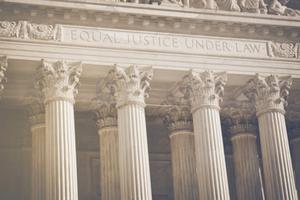Supreme Court Poised to Stem Executive and Legislative Overreach
COMMENTARY: If the Court overturns 1984’s ‘Chevron v. Natural Resources Defense Council, it will be an important check that will rein in the administrative state.

The proper balance of powers in the three branches of our federal government — judicial, legislative, and executive — is very important when it comes to safeguarding individual freedoms like religious freedom and free speech. This is even more crucial when, as we have seen these last three years with the Biden administration, the executive branch brazenly weaponizes the administrative state to push through policy priorities.
Fortunately, the Supreme Court seems poised to restore the judiciary’s ability to check such overreach in an important pair of cases it is reviewing this term.
On Wednesday morning, the Court held more than three and a half hours of oral argument in a pair of cases, Loper Bright Enterprises v. Raimondo and Relentless v. Department of Commerce. The cases involve the Magnuson-Stevens Act, a law governing fishery management in federal waters, which authorizes the National Marine Fisheries Service (NMFS) under narrow circumstances to require fishing vessels to carry and pay federal observers who enforce agency regulations, subject to a salary cap of the value of the vessel’s haul.
In what can only be described as administrative overreach, the NMFS claims implicit power under the statute to compel a wide variety of domestic vessels to pay monitor salaries of up to 20% of their revenues (to the tune of about $710 per day) — numbers that appear nowhere in the text of the statute. The lower courts reviewing these cases deferred to NMFS’s interpretation, citing a 1984 Supreme Court case, Chevron v. Natural Resources Defense Council.
Known as the doctrine of Chevron deference, this principle directs courts to defer to federal agencies’ interpretation of the laws that they administer when the text is silent or ambiguous. Critics of Chevron deference note that agencies have every reason to interpret the laws they administer broadly to expand their own power and that such deference gives the government an unfair advantage over the people. Deferring to bureaucrats also undermines the important “give-and-take” of the legislative process.
In short, Chevron deference has allowed federal agencies to take over the courts’ power to interpret the law and Congress’ power to legislate.
Becket Fund for Religious Liberty filed a friend of the court brief on behalf of the Little Sisters of the Poor and in support of the fishermen raising an additional concern: the negative impact of Chevron on religious liberty.
In a commentary piece prior to Wednesday’s oral argument, Becket President Mark Rienzi, explained: “[L]ike the fishermen in Loper Bright and Relentless, the Little Sisters have felt the sting of the administrative state. In fact, despite winning their own case three times at the Supreme Court so far, the Little Sisters’ litigation has now entered its second decade, largely thanks to the administrative state.” Describing in detail never-ending litigation to defend their right to be free from the demands of an agency-created “contraceptive mandate,” he urged the Court to “not allow the administrative state to continue to warp the rest of our government.”
The Supreme Court, with a majority of the justices committed to interpreting the law as written, has not relied on Chevron in recent years. Instead, the Court has relied on its “major questions doctrine” to strike down a small number of measures constituting executive overreach, like President Biden’s student loan forgiveness plan. Nevertheless, Chevron continues to foment confusion and inconsistency among lower courts, often to the benefit of the administrative state.
While it is always tricky to predict how the Court will rule based on what happened during oral argument, it is safe to say that the Justices Elena Kagan, Sonia Sotomayor and Ketanji Brown Jackson appear fully supportive of keeping Chevron. The court’s majority, by contrast, are not so enamored. Justices Neil Gorsuch and Brett Kavanaugh — both of whom were long-time appeals court judges before taking seats on the Supreme Court — were particularly animated in favor of overturning Chevron.
Gorsuch raised his concern of the government’s unfair advantage with Biden’s Solicitor General Elizabeth Prolegar: “The cases I saw routinely on the courts of appeals — and I think this is what niggles at so many of the lower court judges — are the immigrant, the veteran seeking his benefits, the Social Security disability applicant, who have no power to influence agencies, who will never capture them, and whose interests are not the sorts of things on which people vote, generally speaking. And there Chevron is almost always.”
And when Prelogar urged the Court to issue a ruling in the cases that demands lower courts spend more time looking at whether a law is ambiguous in order to spare Chevron, Gorsuch asked: “Haven’t we done that already?” He then lamented that “lower court judges, even here in this rather prosaic case, can’t figure out what Chevron means.”
Toward the end of Wednesday’s argument, Kagan characterized Chevron as a “doctrine of humility” by obliging courts to defer to agencies with particular expertise. Gorsuch was quick to respond, saying that “one lesson of humility is to admit that you’re wrong.”
Supreme Court expert Carrie Severino, president of the Judicial Crisis Network, offered a concise summary of Wednesday’s marathon argument in a press release: “Today the justices agreed on one thing: these cases are about ‘who decides?’ The liberal justices repeatedly suggested that ‘expert’ agency bureaucrats should be trusted over judges or even legislators. But the Court’s constitutionalist majority appeared to recognize that judges letting unelected bureaucrats interpret federal statutes isn’t humility, it’s an abdication of the judicial role.”
Overturning Chevron is an important check that will rein in the administrative state, expect Congress to draft less ambiguous laws, and enable the judiciary to interpret these laws as written. Without such a proper respect for the separation of powers, the guarantees outlined in the Constitution are at risk.














